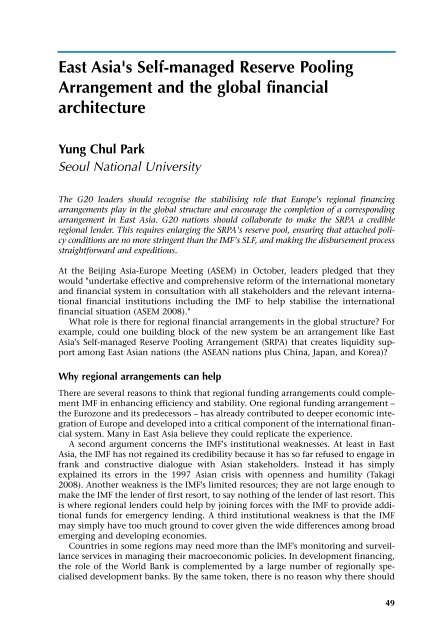What G20 Leaders Must Do To Stabilise our Economy and Fix ... - Vox
What G20 Leaders Must Do To Stabilise our Economy and Fix ... - Vox
What G20 Leaders Must Do To Stabilise our Economy and Fix ... - Vox
You also want an ePaper? Increase the reach of your titles
YUMPU automatically turns print PDFs into web optimized ePapers that Google loves.
East Asia's Self-managed Reserve PoolingArrangement <strong>and</strong> the global financialarchitectureYung Chul ParkSeoul National UniversityThe <strong>G20</strong> leaders should recognise the stabilising role that Europe's regional financingarrangements play in the global structure <strong>and</strong> enc<strong>our</strong>age the completion of a correspondingarrangement in East Asia. <strong>G20</strong> nations should collaborate to make the SRPA a credibleregional lender. This requires enlarging the SRPA's reserve pool, ensuring that attached policyconditions are no more stringent than the IMF's SLF, <strong>and</strong> making the disbursement processstraightforward <strong>and</strong> expeditious.At the Beijing Asia-Europe Meeting (ASEM) in October, leaders pledged that theywould "undertake effective <strong>and</strong> comprehensive reform of the international monetary<strong>and</strong> financial system in consultation with all stakeholders <strong>and</strong> the relevant internationalfinancial institutions including the IMF to help stabilise the internationalfinancial situation (ASEM 2008)."<strong>What</strong> role is there for regional financial arrangements in the global structure? Forexample, could one building block of the new system be an arrangement like EastAsia's Self-managed Reserve Pooling Arrangement (SRPA) that creates liquidity supportamong East Asian nations (the ASEAN nations plus China, Japan, <strong>and</strong> Korea)?Why regional arrangements can helpThere are several reasons to think that regional funding arrangements could complementIMF in enhancing efficiency <strong>and</strong> stability. One regional funding arrangement –the Eurozone <strong>and</strong> its predecessors – has already contributed to deeper economic integrationof Europe <strong>and</strong> developed into a critical component of the international financialsystem. Many in East Asia believe they could replicate the experience.A second argument concerns the IMF's institutional weaknesses. At least in EastAsia, the IMF has not regained its credibility because it has so far refused to engage infrank <strong>and</strong> constructive dialogue with Asian stakeholders. Instead it has simplyexplained its errors in the 1997 Asian crisis with openness <strong>and</strong> humility (Takagi2008). Another weakness is the IMF's limited res<strong>our</strong>ces; they are not large enough tomake the IMF the lender of first resort, to say nothing of the lender of last resort. Thisis where regional lenders could help by joining forces with the IMF to provide additionalfunds for emergency lending. A third institutional weakness is that the IMFmay simply have too much ground to cover given the wide differences among broademerging <strong>and</strong> developing economies.Countries in some regions may need more than the IMF's monitoring <strong>and</strong> surveillanceservices in managing their macroeconomic policies. In development financing,the role of the World Bank is complemented by a large number of regionally specialiseddevelopment banks. By the same token, there is no reason why there should49














